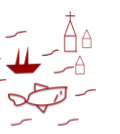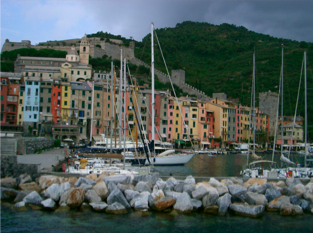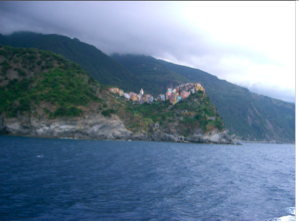Part III. Italy
Chapter 39. Vernazza and Corniglia [December 24, 1347]
Cultural Explanations
 |
Part III. Italy Chapter 39. Vernazza and Corniglia [December 24, 1347] Cultural Explanations |
|
 |
In this chapter Bávlos survives the sea and finds himself in a little coastal village. |
| ship, great fish, village |
In this chapter, Bávlos makes it to shore, thanks to the friendly office of a dolphin. Stories of dolphins saving the lives of sailors who fell off their ships or were thrown into the sea are ancient and widespread in the Mediterranean area, as evidenced by the Classical mythological figures Melicertes/Palaemon and Arion. Dolphins cooperate with each other to raise young, sick, or sleeping pod members to the surface to breed, and this communal behavior, along with the animal's natural curiosity and prodigious intelligence-- is sometimes cited as a possible explanation for how such life-saving feats could have come to pass.
The dolphin species of the Mediterranean are the common dolphin, bottle-nosed dolphin, and the striped dolphin. Bávlos knows dolphins from the Arctic coast, where the common species is the white-peaked dolphin, a somewhat larger but otherwise very similar species.
 |
 |
| Vernazza | Corniglia |
Bávlos and Nieiddash make it to land at the village of Vernazza, on the famed Cinque Terre coastal area of western Italy. Reindeer are strong swimmers and will swim regularly to cross rivers during seasonal migrations or even to swim out to islands in the ocean to take advantage of grazing there.
Bávlos mentions Stállu, the dreaded Christmas visitor who likes to suck the blood out of noisy children. Christmas was considered the shortest day of the year, and in the far north of the ancient past, the fear that the sun might never return from its long winter absence was a powerful and quite imaginable scenario. Propitiatory acts were thus understandable, and these coalesced around the concept of providing for the ogre Stállu. In Sámi tradition, one went through the Christmas night in fear, listening for the dreaded fiend whose sled, drawn by rats and other vermin, might pull up outside one's home during the long winter's night. Clearing all brush and sticks from the area around the goahti was a duty that children were enjoined to do at Christmas time right into the twentieth century, and the tradition of bringing in a supply of water for Stállu to drink was also commonly practiced up through the time of the second World War. For more details on Stállu, read Chapter 40!